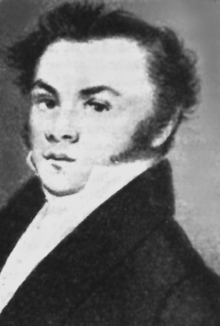Karl Eduard von Eichwald (Russian: Эдуард Иванович Эйхвальд, Eduard Ivanovich Eykhvald; 4 July 1795, in Mitau, Courland Governorate – 10 November 1876, in Saint Petersburg) was a Baltic German geologist, physician, and naturalist, who lived his whole life in the Russian Empire.
Karl Eichwald | |
|---|---|
 | |
| Born | 4 July 1795 |
| Died | 10 November 1876 (aged 81) |
| Nationality | Baltic German |
| Citizenship | Russian Empire |
| Known for | Describing new reptile species |
| Scientific career | |
| Fields | Geology Medicine |
| Institutions | Kazan University, Vilnius University, St. Petersburg University |
| Author abbrev. (botany) | Eichw. |
Career edit
Eichwald was a Baltic German born at Mitau in Courland Governorate. He became a doctor of medicine and professor of zoology in Kazan in 1823; four years later professor of zoology and comparative anatomy at Vilnius; in 1838 professor of zoology, mineralogy and medicine at St. Petersburg; and finally, professor of palaeontology in the institute of mines in that city.
He travelled much in the Russian Empire, and was a keen observer of its natural history and geology. He died at St. Petersburg.
Works edit
His published works include Reise auf dem Caspischen Meere und in den Caucasus, 2 vols. (Stuttgart and Tübingen, 1834-1838); Die Urwelt Russlands (St Petersburg, 1840-1845); Le Lethaea Rossica, ou Paléontologie de la Russie, 3 vols. (Stuttgart, 1852-1868), with Atlases.
In the scientific field of herpetology he described several new species of reptiles.[2]
See also edit
Notes edit
- ^ Corsi, Pietro. (2005). Before Darwin: Transformist Concepts in European Natural History. Journal of the History of Biology 38: 67-83.
- ^ The Reptile Database. www.reptile-database.org.
- ^ International Plant Names Index. Eichw.
References edit
- Chisholm, Hugh, ed. (1911). . Encyclopædia Britannica (11th ed.). Cambridge University Press.
External links edit
- Rulex.ru: Biography of Karl Eichwald—(in Russian)